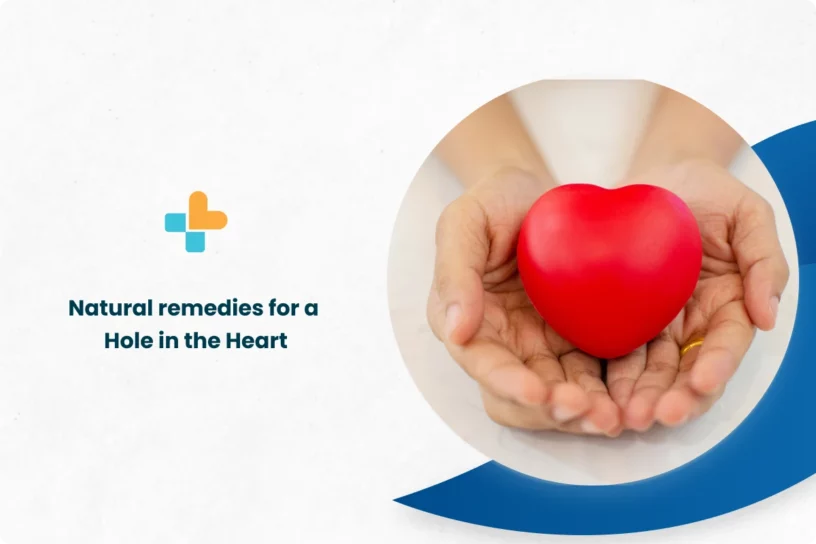Introduction:
A hole in the heart, also known as a atrial septal defect, is a congenital heart condition that occurs when there is a hole in the wall (septum) that separates the two upper chambers of the heart (the atria). This hole allows blood to flow between the two chambers, which can increase the workload on the heart and cause symptoms such as shortness of breath and fatigue. While traditional treatments for a hole in the heart include surgery or medication, there are also natural treatment options that can be used to help manage the condition.
Symptoms:
Symptoms of a hole in the heart can vary depending on the size of the hole and the individual’s overall health. Common symptoms include shortness of breath, fatigue, rapid heartbeat, and chest pain. In some cases, a hole in the heart may not cause any symptoms at all.
How is it diagnosed?
A hole in the heart is typically diagnosed through a physical exam and a variety of tests, such as an echocardiogram, electrocardiogram, and chest x-ray.
Side effects of a hole in the heart:
The side effects of a hole in the heart can include fatigue, shortness of breath, and chest pain. In some cases, a hole in the heart can also lead to other complications such as pulmonary hypertension, an enlarged heart, or stroke.
What causes it?
A hole in the heart is caused by a failure in the development of the septum, the wall that separates the two upper chambers of the heart, during fetal development. This can be caused by a number of factors, including genetics, exposure to certain toxins or drugs, or certain viral infections.
Problems that can occur:
A hole in the heart can lead to a number of problems, including an increased workload on the heart, which can cause fatigue and shortness of breath. Over time, a hole in the heart can also lead to an enlarged heart, or even heart failure.
Natural treatment for a hole in the heart:
There are several natural treatment options that can be used to help manage a hole in the heart. These include:
1. Garlic:
Garlic has been shown to have antioxidant and anti-inflammatory properties, which can help to improve heart health and lower the risk of heart disease.
2. Coenzyme Q-10 (CoQ10):
CoQ10 is a nutrient that plays a vital role in the energy production of cells, particularly in the heart. It has been shown to improve heart function and reduce the risk of heart disease.
3. Red Yeast Rice:
Red yeast rice is a traditional Chinese medicine that has been used for centuries to improve heart health. It contains compounds that can lower cholesterol levels and improve heart function.
4. Flaxseed:
Flaxseed is high in omega-3 fatty acids, which have been shown to have anti-inflammatory properties and can help to improve heart health.
5. Vitamin K2:
Vitamin K2 is a nutrient that plays a vital role in the health of the cardiovascular system. It has been shown to improve heart function and lower the risk of heart disease.
6. Resveratrol:
Resveratrol is a natural compound found in red wine and certain fruits and vegetables. It has been shown to have antioxidant and anti-inflammatory properties, which can help to improve heart health.
Use of Supplements in High-Risk Patients:
It is important to note that while natural treatment options may be beneficial for managing a hole in the heart, they should not be used as a substitute for traditional medical treatment. Individuals with a hole in the heart who are considered to be at high risk, such as those with a large hole or other underlying heart conditions, should only use natural treatment options under the supervision of a healthcare professional.
Doctor’s Supervision:
It is important to consult with a healthcare professional before starting any natural treatment options, as they may interact with any medications or treatments you are currently taking. A healthcare professional can also help to monitor your progress and make any necessary adjustments to your treatment plan.
In conclusion, a hole in the heart, also known as atrial septal defect, is a congenital condition that can cause symptoms such as shortness of breath and fatigue. While traditional treatments for a hole in the heart include surgery or medication, natural treatment options may also be beneficial in managing the condition. These include garlic, Coenzyme Q-10 (CoQ10), red yeast rice, flaxseed, Vitamin K2, and resveratrol. However, it is important to consult with a healthcare professional and use these natural treatments under their supervision, especially in high-risk patients. Additionally, it is important to remember that natural treatments should not be used as a substitute for traditional medical treatment. With the guidance of a healthcare professional, individuals with a hole in the heart can work to manage their condition and improve their overall heart health.
FAQs:
- Can hole in heart be cured naturally?
A hole in the heart, also known as a congenital heart defect, is a structural abnormality that typically requires surgical intervention to repair. While some mild cases may not require surgery and can be managed with medication and lifestyle changes, there is no known natural cure for this condition.
2. How do you heal a hole in your heart without surgery?
While surgery is the most common and effective treatment for a hole in the heart, there are some cases where a hole may be small enough and not cause any symptoms that may not require surgery. In these cases, treatment may include medication to manage symptoms, and lifestyle changes such as avoiding strenuous activity and maintaining a healthy weight. However, it’s important to consult with a cardiologist to determine the best course of treatment for your specific condition.
Our Hospital Locations
Cardiology Surgery Hospitals in Chandigarh | Cardiology Surgery Hospitals in Bangalore | Cardiology Surgery Hospitals in Jaipur | Cardiology Surgery Hospitals in NCR | Cardiology Surgery Hospitals in Hyderabad
Our Doctors
Cardiology Surgery Doctors in Chandigarh | Cardiology Surgery Doctors in Bangalore | Cardiology Surgery Doctors in Jaipur | Cardiology Surgery Doctors in NCR | Cardiology Surgery Doctors in Hyderabad
About the Author

Dr. Magesh Balakrishnan
Dr. Magesh Balakrishnan is a renowned cardiologist currently practicing at Ayu Health, Bangalore.
He has 16 years of experience in this field. He has excellent skills in performing all cardiac diagnostic procedures/ tests. He has performed emergency and elective angiographies and angioplasties, device implantation (Pacemaker, AICD & CRT)




